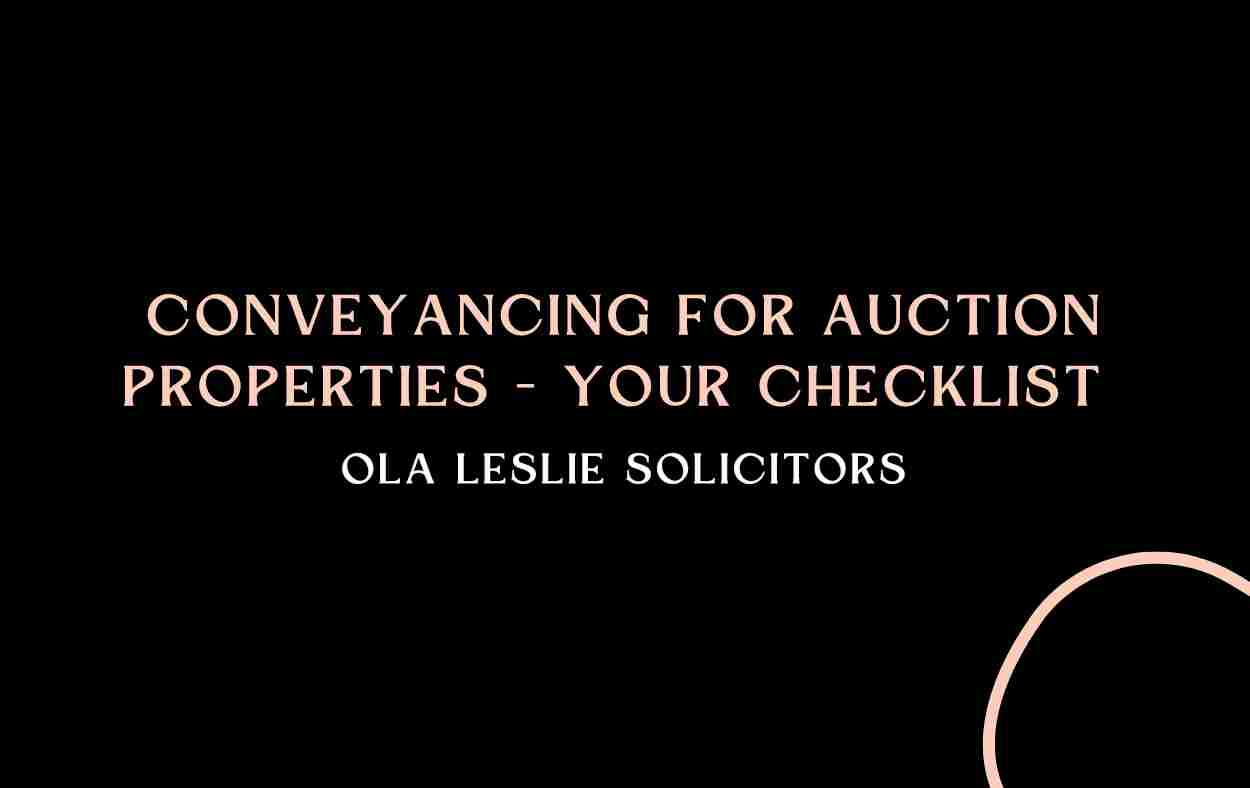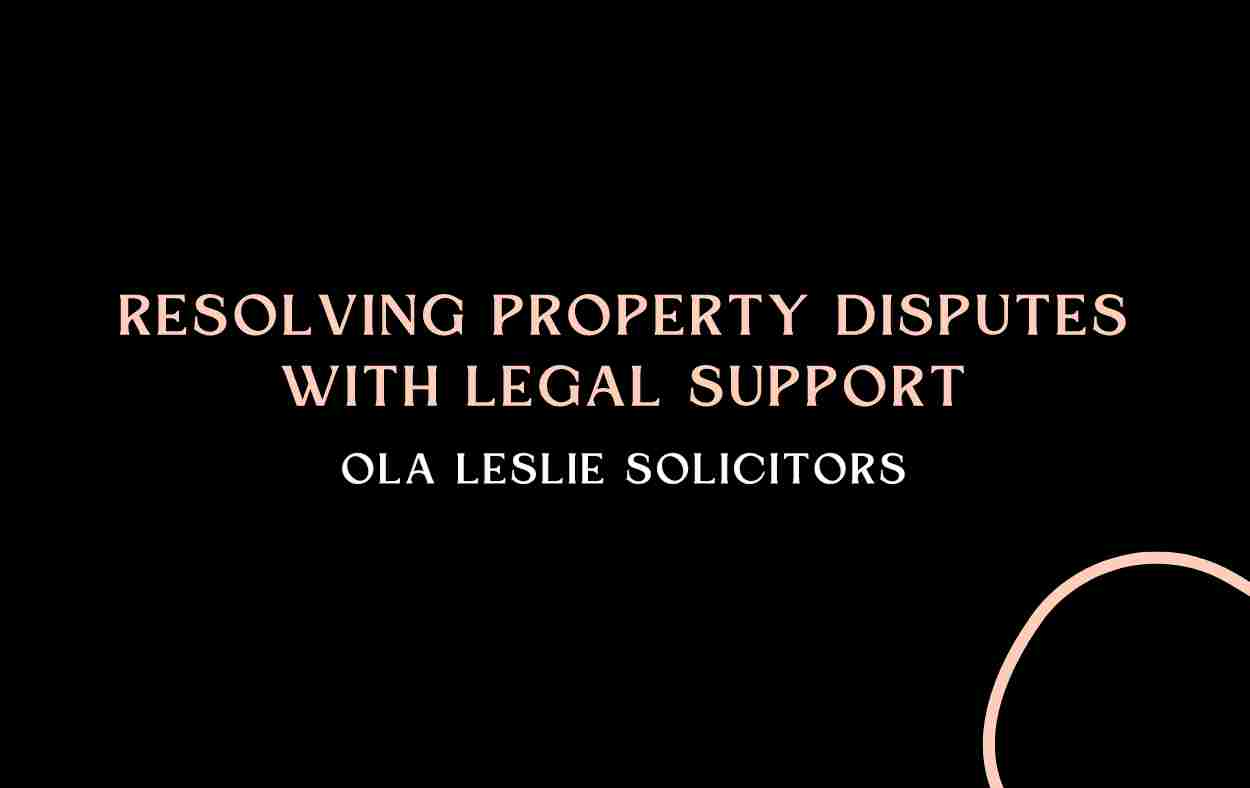Conveyancing for Auction Properties - Your Checklist
- Ola Leslie Solicitors

What is Auction Conveyancing?
Auction conveyancing refers to the legal process required to complete a property purchase made at a public sale where land or property is sold to the highest bidder. Auction property conveyancing is different to the standard way of completing a property transaction.
Auction houses list properties for sale in a catalog several weeks ahead of the auction date, allowing prospective buyers the opportunity to investigate potential purchases. This also gives buyers the chance to instruct a conveyancer who can set the transaction in motion, so the sale completes smoothly after the auction. Buying property at auction offers both opportunities and risks.
Those new to this process should take legal advice before making any offer because a winning bid is binding. There are few options for legal remedy against either seller or auctioneer if an issue is discovered after the auction. A winning bidder will also forfeit their 10 percent deposit if they pull out of the sale after the auction.
Homeward Legal’s partner law firms are experienced in auction property conveyancing and can talk buyers through all their options.
What is the auction conveyancing process?
The biggest difference between conventional conveyancing and the auction conveyancing process is the speed at which contracts are exchanged.
In a typical transaction, you may make an offer that is accepted, but contracts are unlikely to be exchanged for weeks or months, giving both buyer and seller the opportunity to change their mind.
However, when your auction bid is accepted, the contract is instantly concluded. This contract is binding, the sale is complete, and you cannot back out.
You must now pay a deposit, usually 10 percent, and have the balance of the sale price ready to pay within 28 days.
To buy at auction, your legal work must be done ahead of time, that’s why you need to instruct an experienced auction conveyancing solicitor before you make any offer.
How quickly does a property auction sale complete?
An auction sale completes very quickly. A conveyancing transaction done in the usual way can take a minimum of eight weeks and often much longer to complete because the work begins after a buyer makes an offer that is accepted by the seller.
In auction property conveyancing, the legal work must be done in advance of the auction itself. So, when a bid is accepted, effectively contracts are then exchanged, and the buyer must pay a 10 percent deposit and prove he or she has the funds to pay the balance.
That balance is usually paid within 28 days, meaning the auction conveyancing process is done in a much shorter timeframe than normal.
Buying at auction is a legally binding process, so it’s crucial anyone considering making an offer gets expert legal advice beforehand.
If you’re looking for a fully qualified and experienced property auction conveyancer, Homeward Legal can help you. We’ll put you in touch with one of our specialist panel solicitors across England and Wales.
What are the typical auction fees for selling?
Typical auction fees for buying include an administration fee that is paid to the auction house. This is usually between £200 and £300 and may either be a fixed fee or a percentage of the sale price. The admin fee covers the auctioneer’s costs, is subject to VAT and is paid at the same time as the deposit. You may also be subject to a “buyer’s premium”, which is an additional percentage charge on the winning bid at auction. The sale catalogue will indicate properties where a buyer’s premium is being charged. When budgeting for a property buys, you need to take these charges into consideration along with your essential auction conveyancing fees.
Do I need a conveyancer before the auction?
There is no legal requirement to have a conveyancing solicitor in place before you buy at auction. However, instructing property auction solicitors beforehand is the most prudent course of action. As well as examining the auction legal pack, solicitors can also offer other services that will help in your decision to bid or not to bid on auction day. This might include an Auction Title Checker that will examine who owns the property, any issues around leasehold and any charges on the property, such as outstanding mortgages.
A Pre-Auction Report includes a review of all available paperwork, identifies any missing documentation, examines legal ownership and highlights any potential risks for a purchaser. Instructing a conveyancer before auction gives you access to legal advice on how best to make a successful bid.
Do I need to have finance in place before buying at auction?
In a word, yes. If your bid is successful on the day, you must pay a deposit of 10 percent of the purchase price immediately. The auctioneers will also ask for proof of funds to pay the balance by completion, usually only 28 days later. That means you must ensure all your finance is in place before making any bid.
Cash buyers will have to demonstrate they have the money in place, and if you’re buying with a mortgage, you must arrange an agreement in principle before making any bid. Lenders will only make a definite offer once you have bid on a specific property. Your auction conveyancing solicitor will liaise with the lender before the auction to ensure the finance is secure.
Should I get a building survey done before making a bid at auction?
The sensible answer is that if you are serious about purchasing any property, you should have it surveyed by a RICS chartered surveyor. A building survey will give you an expert opinion on the condition of a property and identify any structural or other issues.
The advantage of having a survey done is that you will know what the property is worth and if it is worth making an offer on.
The disadvantage is you might spend several hundred pounds only not to bid at all – in that case, however, you may have saved yourself thousands in the long run.
When you are buying at auction with a mortgage, your lender is also likely to demand more than simply a valuation report on an auction property. This is because they need to be certain the property is worth what they are lending to you in case of default. Talk to your property auction solicitor about your survey options.
What are the benefits of selling your property at auction?
There are a number of clear benefits of selling your property at auction. Let’s look at a couple of the most obvious ones:
Speed: How quickly a conveyancing transaction can be completed is one of the key advantages of selling at auction. The whole process – from registering with an auction house to the day of sale to completion – can be done in as little as eight weeks, assuming there are no other hitches.
A binding sale: Once a winning bid has been accepted, the buyer must commit to purchasing the property. Legally, the sale contract has been completed the instant that the hammer falls. The buyer must pay a deposit, usually 10 percent, immediately and provide the balance of the sale price within 28 days. Where they fail to complete their side of the deal, the buyer must forfeit their deposit.
Competition among buyers: The catalogue sale price will be set to encourage bidding among those in the auction. Competition among bidders on the day can push the sale price up and help you realize a greater profit than selling in a conventional way through an estate agent.
Setting a reserve price: You can stay in control of the sale by setting a reserve price. This is the basic figure that you want to achieve from the sale. If the auctioneer does not receive any bids that reach the reserve price, the lot will be withdrawn. It is then up to you to decide whether to change the reserve price or to negotiate with those who bid below that figure.
Date of Auction = Date of Exchange
If you’ve placed the highest offer at an auction, if this is above the reserve price set by the seller, then you are the successful buyer of the property. It is important to note that the terms are fixed and there is no cooling-off period when you buy at auction, so there is no option for a change of mind once the winning bid has been placed. For that reason, we strongly recommend obtaining legal advice prior to the auction where possible.
The next steps after the winning bid have been placed are governed by state and territory legislation, but these are generally the same nationwide. Essentially, if you are the successful bidder at an auction, you will be immediately required to sign the contract and pay a deposit.
Therefore, the date of your successful auction will also be the day that contracts are exchanged. Once the date of exchange occurs, you are legally bound by the contract and will risk losing your deposit if you do not complete the purchase.
This differs from a private treaty sale, where an initial holding deposit may be held by an agent accompanying a prospective buyer’s offer – in that case, the deposit would be returned to the prospective buyer for a change of mind, or if their offer was not accepted, as contracts have not yet been exchanged.
Deposit
In all states and territories, the deposit is held in trust until settlement, most often in the real estate agency’s trust account, or that of the seller’s solicitor.
There are multiple ways in which this deposit can be paid, including by way of bank cheque, electronic funds transfer or deposit/bank guarantee. It is recommended to check with the seller or agent before the auction to find out what form of deposit will be accepted, particularly if you are considering using a deposit bond.
There are certain circumstances where the seller may ask the buyer to release the deposit money from the trust account earlier than the settlement date – this requires written permission from the buyer. From a buyer’s perspective, there is significant risk associated with this, and you should ensure you seek legal advice before agreeing to such a request.
Finances
Your method of financing the property is important to consider prior to the auction; in particular, whether you will need to begin the process of applying for a home loan. Most lenders will issue a pre-approval prior to auction but will not provide formal loan approval until after the exchange. It is important to ensure you act quickly following exchange to progress your finances to ensure that settlement is not delayed.
The National Consumer Credit Protection Act (2009) applies nationwide and specifies that lenders must outline any fees and charges in a pre-contractual statement, and they must also provide an information statement explaining your rights and obligations.
When you receive formal approval for your mortgage application, your lender will provide you with a letter of offer and a mortgage contract to sign; your solicitor can review this paperwork from your mortgage before you sign.
Settlement
While the exchanging of contracts for the sale of the property is legally binding, the sale and transfer of property is only completed at settlement. This is typically 30 days after exchange in the ACT; however, this can vary depending on the specific terms of the contract.
Settlement is the process conducted between the legal and financial representatives of both parties. Most settlements within the ACT are now facilitated through the electronic lodgment service PEXA. On the settlement date final checks will be made by your solicitor or conveyancer, such as ensuring that all banks involved are ready, and confirming that any caveats or dealings registered on title have been removed.
At settlement, all charges on the property such as general rates and water rates will be adjusted between the parties to ensure that the seller is responsible for rates up to and including the day of settlement, and the buyer liable from the day after settlement.
On settlement, the balance of the purchase price is paid to the seller in exchange for the title to the property, the deposit is released to the seller, and unless other arrangements such as early occupation have been made, the buyer will have access to the keys and can take possession of the property.









